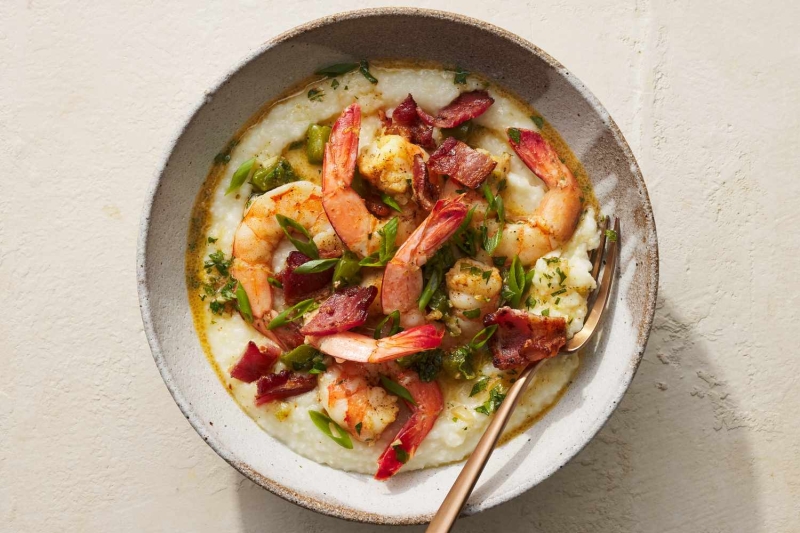Prep: 20 mins
Cook: 80 mins
Total: 100 mins
Servings: 4 servings
Shrimp and grits is an iconic southern specialty of sauteed shrimp (sometimes in a gravy) served over cheesy grits. It may surprise you that this dish, found on restaurant menus from New York City to Los Angeles, is a relatively recent adaptation on a Lowcountry home cooking breakfast staple.
The History of Shrimp and Grits
Shrimp and grits started out as “breakfast shrimp,” a Lowcountry or Gullah dish of shrimp cooked simply, sometimes in a roux-based gravy, and served over ground corn, rice, or hominy (notably, some refer to grits as hominy, and hominy can be used to make a dish resembling grits—it is likely that shrimp has graced all of the above). The dish has ties to Africa, brought by enslaved people and adapted over time to use ingredients available to them.
Shrimp are easy enough to find in the brackish waters of Lowcountry tidal creeks, and corn grits would almost certainly have been part of the meager food rations provided by plantation owners. After emancipation, both ingredients remained staples in the region and the combination of shrimp and corn grits was embedded in the culture as a sustaining breakfast food.
What Is Breakfast Shrimp?
There is no single way to make breakfast shrimp. Some cooks use a roux-based gravy while others make a thinner gravy. Sometimes coffee is added to the gravy in the style of red eye gravy. Usually there is some pork involved, whether fatback, salt pork, bacon, or just bacon grease.
Shrimp and Grits Goes National
So how did this dish make the transformation from home cooked breakfast shrimp to the fine dining darling, shrimp and grits? In the mid-1980s a chef named Bill Neal put his version of the dish on the menu at Crook’s Corner, a now-famous restaurant in Chapel Hill, NC. In the years after, other chefs followed suit, eventually turning breakfast shrimp, a.k.a. shrimp and grits, into a nationally known dish.
This recipe hews to the modern interpretation of shrimp and grits and adds a Louisiana twist with Creole seasoning and green bell pepper. The most time-consuming part of the dish is cooking the grits, and while there are plenty of quick-cooking or instant grits out there, do not fall for the siren song of convenience!
The Best Grits To Use for Shrimp and Grits
Stone-ground grits may take longer to cook, but their flavor is incomparable. They actually taste of sweet corn, not whatever flavorings and other ingredients are added in to make instant grits palatable. You may have to look for these grits outside your usual grocery stomping grounds. Try specialty food retailers or online suppliers like Anson Mills or Southern Queen Foods.
What Kind of Shrimp To Use for Shrimp and Grits
As for the shrimp, I prefer larger shrimp as they are easier and less time consuming to peel and devein, but you can make do with the shrimp available to you, as befits the history of this dish.
For a shrimp and grits that leans into the restaurant aesthetic, choose jumbo or colossal shrimp, and if you can find them with the heads still on even better. Just keep in mind that you’ll want to cook live head-on shrimp the same day you buy them. Shrimp heads contain an enzyme that will cause the meat to become mushy if the shrimp are stored and allowed to die.
Tips for Making Shrimp and Grits
- Use stone-ground grits—There is no substitute for high-quality stone-ground grits in this dish.
- A watched pot never scorches—As the grits cook, they will need to be stirred progressively more and more. Towards the very end of cooking, when the liquid is reduced and the grits are thick, you should be stirring almost constantly to prevent the grits from burning on the bottom of the pot.
- Go hands-off with a slow cooker—Stone-ground grits can be cooked in a slow cooker instead of on the stovetop. While it takes longer, the process is hands-free, allowing you to focus on the shrimp and gravy while the grits cook quietly in the background.
- Mind the salt—Creole seasonings can vary in salt level, so add the smaller amount of seasoning to begin with and taste the sauce before adding any more seasoning or salt.
- Using shell-on or head-on shrimp—If you’re starting with shell-on or head-on shrimp vs. already peeled and deveined shrimp, you will need to buy more shrimp. For shell-on shrimp, buy 1 1/4 pounds. For head-on shrimp, buy 1 1/2 pounds.
«These are maybe the best grits I’ve ever had. It seems like so much liquid when you start but the end result is so tender and creamy and deeply flavorful. The flavors of the dish are well-balanced, and the creole seasoning leaves just the slightest tingle on your lips.»—The Spruce Eats Test Kitchen

A Note From Our Recipe Tester
Ingredients
-
2 1/2 cups water
-
4 cups low-sodium chicken stock, divided
-
1 cup (153 grams) uncooked stone-ground grits
-
1/2 teaspoon fine salt
-
1 cup (4 ounces) shredded sharp white cheddar cheese
-
1/4 cup (2 ounces; 57 grams) unsalted butter, divided
-
1 bunch green onions
-
4 center-cut bacon slices (about 4 ounces)
-
1 cup chopped green bell pepper (from 1 medium pepper)
-
6 cloves garlic, chopped
-
1 pound large raw peeled and deveined shrimp (if desired, leave the tails on for presentation)
-
1 to 2 teaspoons Creole seasoning
-
1 teaspoon grated lemon zest
-
1 tablespoon fresh lemon juice
-
2 tablespoons chopped fresh flat-leaf parsley for serving, optional
Steps to Make It
-
Gather the ingredients.
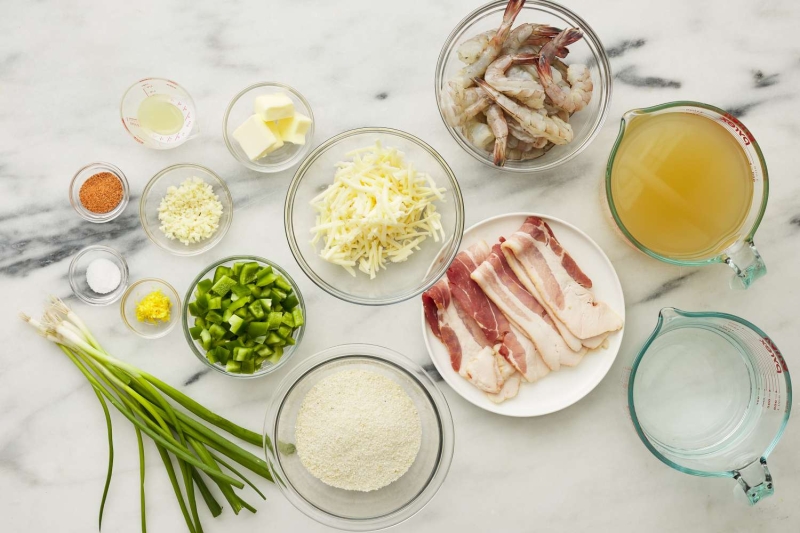
-
Bring 2 1/2 cups water and 3 1/2 cups of the low-sodium chicken stock to a boil over medium-high heat in a large saucepan.
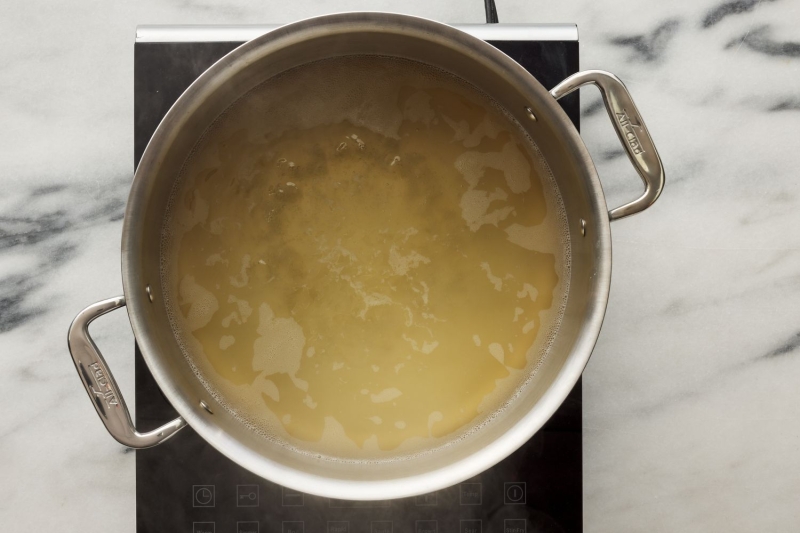
-
Whisk in 1 cup (153 grams) stone-ground grits and 1/2 teaspoon fine salt. Reduce the heat to medium-low and simmer, uncovered, whisking often, until the liquid is absorbed and the grits are thickened and tender, about 1 hour.
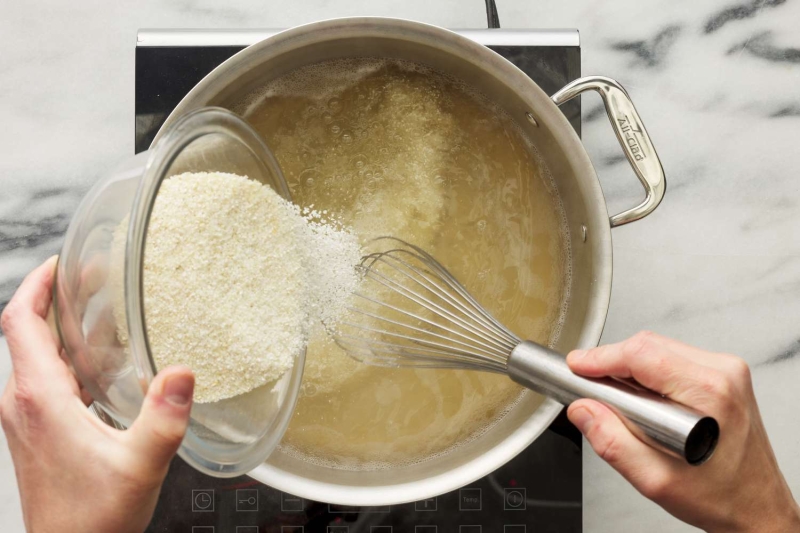
-
Remove the grits from the heat and stir in 1 cup (4 ounces) shredded sharp white cheddar cheese and 2 tablespoons of the unsalted butter.
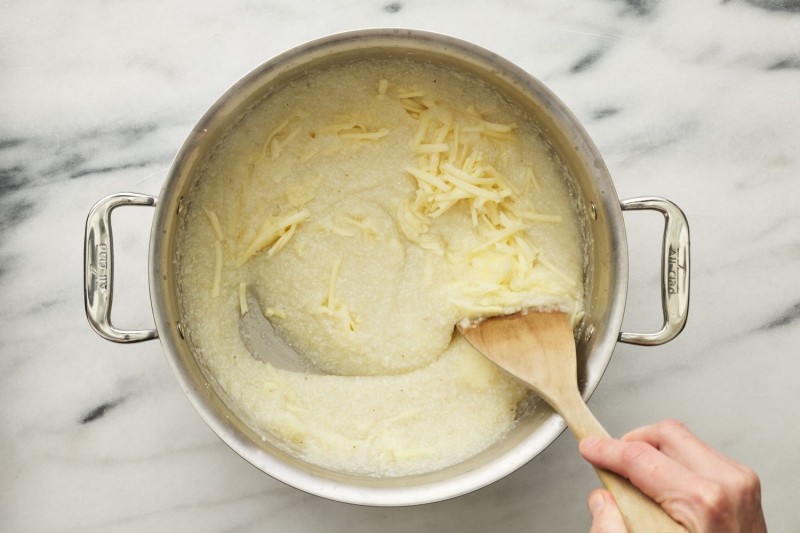
-
Meanwhile, thinly slice the white and light green parts of 1 bunch green onions and transfer to a small bowl. Thinly slice the dark green tops and set aside.
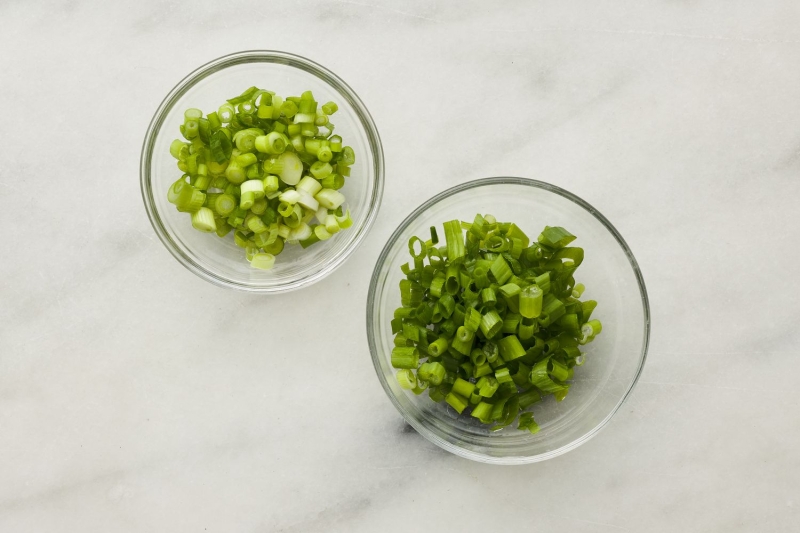
-
Place 4 center-cut bacon slices in a large nonstick skillet over medium heat. Cook, flipping once, until the fat has rendered and the bacon is crispy, 8 to 10 minutes. Transfer the bacon to a plate lined with paper towels. Do not wipe the skillet clean.
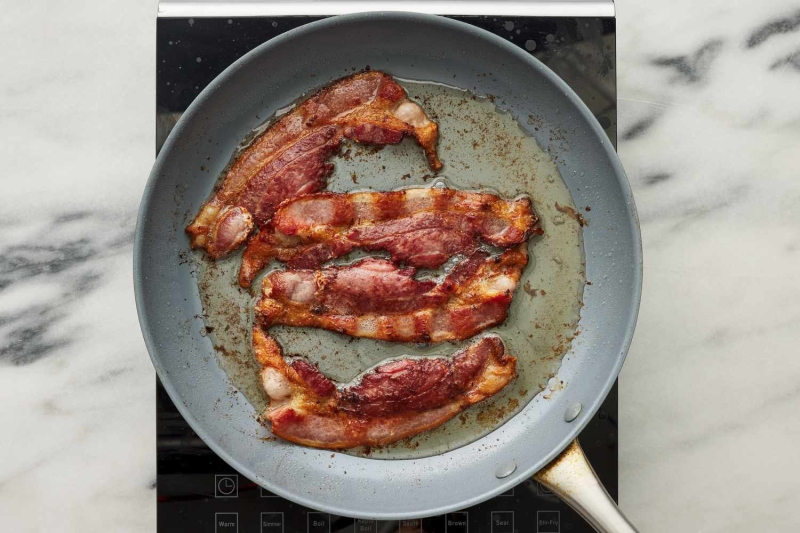
-
Add 1 cup chopped green bell pepper, 6 cloves garlic, chopped, and the reserved white and light green parts of the green onions to the skillet with the bacon grease. Cook over medium heat, stirring often, until the peppers have softened, about 5 minutes
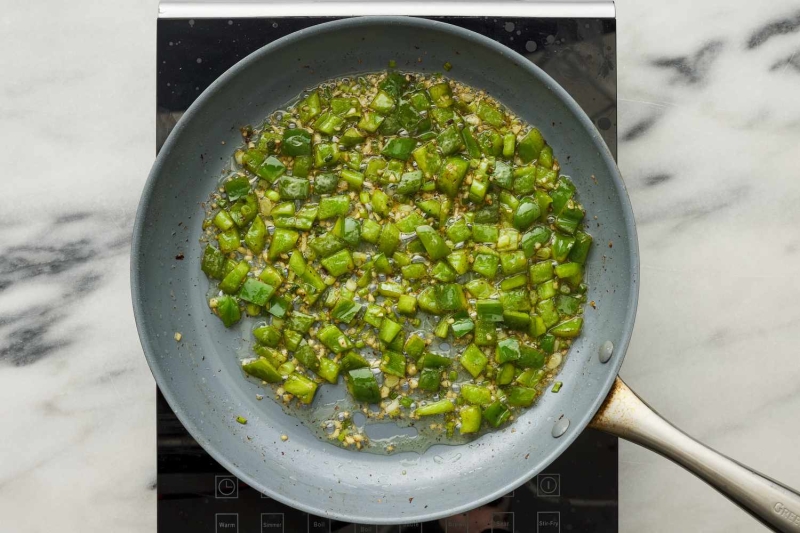
-
Stir in 1 pound large raw peeled and deveined shrimp, 1 to 2 teaspoons Creole seasoning, and remaining 1/2 cup chicken stock. Cook, stirring occasionally, until shrimp are just cooked through and no longer translucent, about 3 minutes
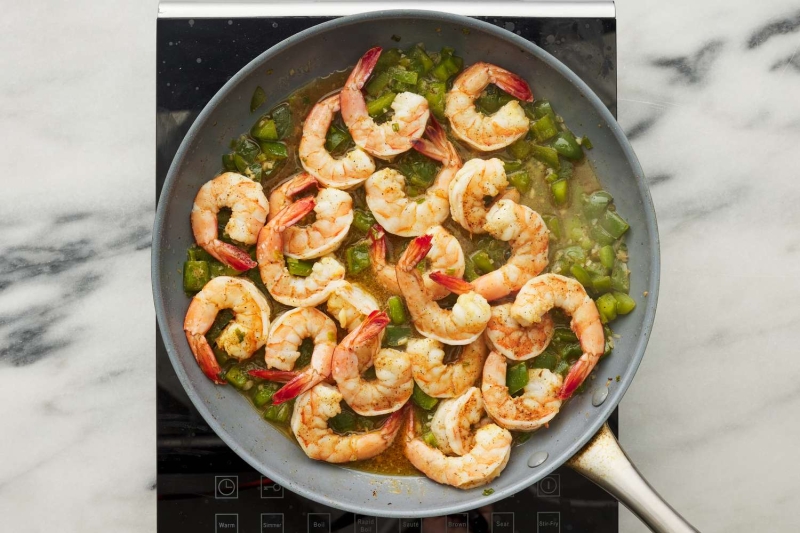
-
Using tongs, transfer the shrimp from the skillet to a large bowl. Cook the stock mixture until reduced by half, 1 to 2 minutes. Taste the sauce and add salt if needed.
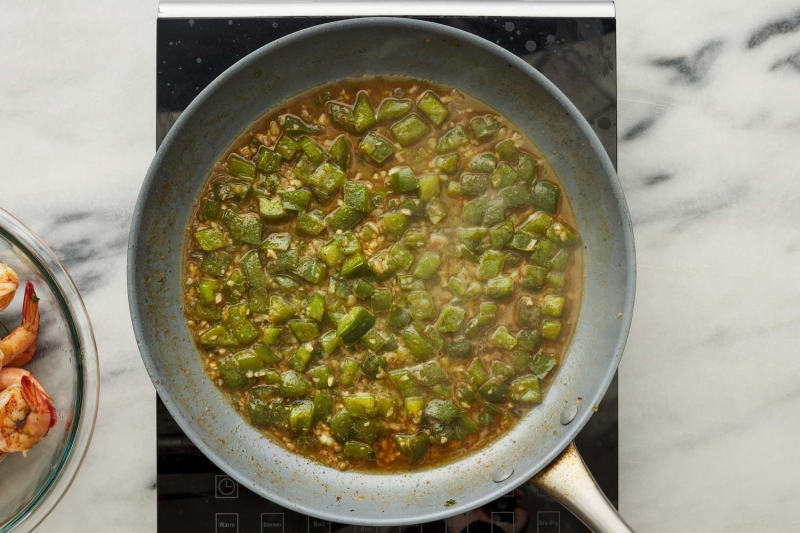
-
Take the skillet off the heat and whisk in the remaining 2 tablespoons unsalted butter until the butter has melted and the sauce is thick and glossy, then stir in 1 teaspoon grated lemon zest, 1 tablespoon fresh lemon juice, and 2 tablespoons chopped parsley.
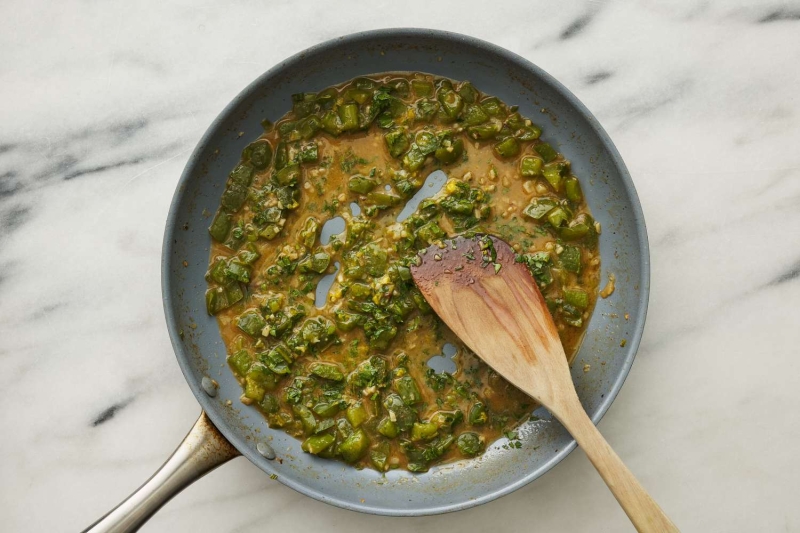
-
Return the shrimp to the skillet and toss to coat in the sauce
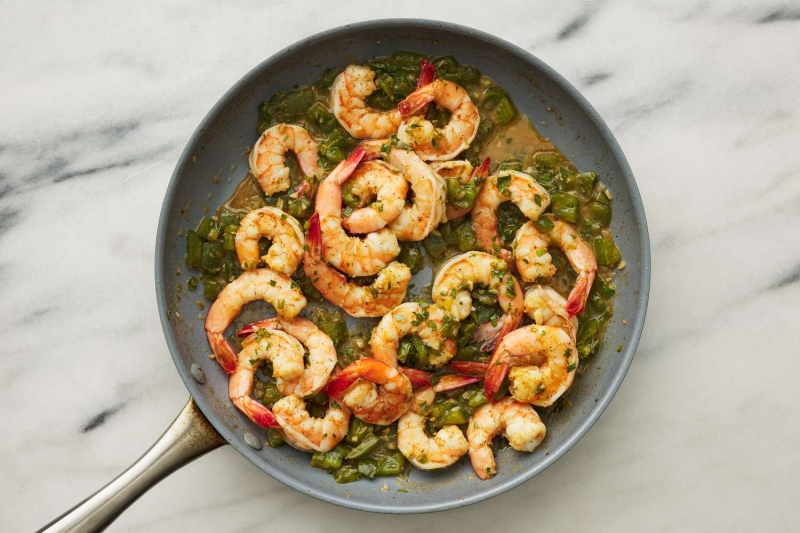
-
Chop the cooked bacon. Divide the grits evenly among 4 bowls. Top the grits with the shrimp and bacon and garnish with the reserved green onion tops.
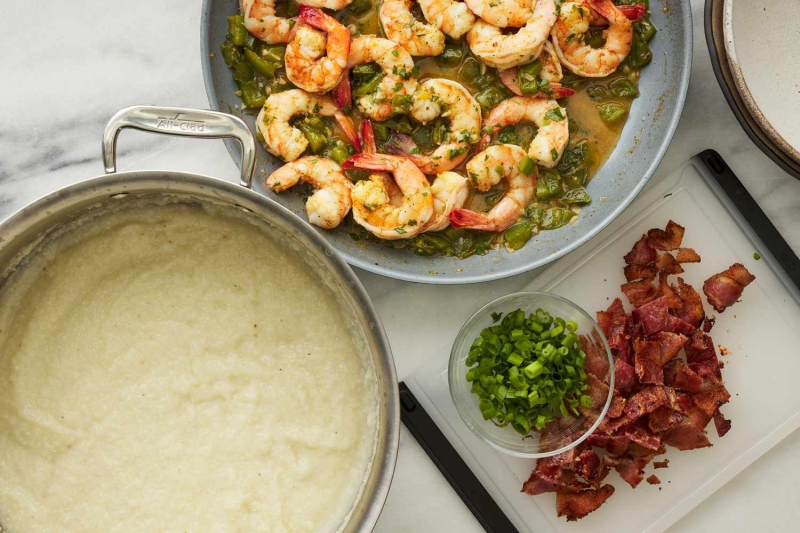
How to Store
Let grits and shrimp cool to room temperature before transferring to separate airtight containers. Store in the refrigerator for up to 2 days. Reheat grits in a medium saucepan with 1 cup stock or water, whisking often, until heated through. Reheat shrimp in a nonstick skillet with 1/4 cup of stock until heated through.
| Nutrition Facts | |
|---|---|
| Servings: 4 | |
| Amount per serving | |
| Calories | 860 |
| % Daily Value* | |
| Total Fat 54g | 69% |
| Saturated Fat 23g | 115% |
| Cholesterol 402mg | 134% |
| Sodium 2512mg | 109% |
| Total Carbohydrate 19g | 7% |
| Dietary Fiber 1g | 5% |
| Total Sugars 3g | |
| Protein 73g | |
| Vitamin C 32mg | 161% |
| Calcium 385mg | 30% |
| Iron 4mg | 21% |
| Potassium 796mg | 17% |
| *The % Daily Value (DV) tells you how much a nutrient in a food serving contributes to a daily diet. 2,000 calories a day is used for general nutrition advice. | |
